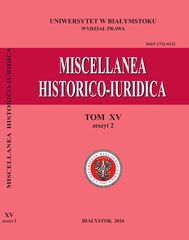Instytucje demokracji bezpośredniej w państwach autorytarnych w międzywojennej Europie
Direct Democracy Institutions in Authoritarian States in Pre-War Europe
Author(s): Władysław T. KuleszaSubject(s): Law, Constitution, Jurisprudence, History of Law
Published by: Wydawnictwo Uniwersytetu w Białymstoku
Keywords: authoritarian state; constitution; referendum; direct democracy
Summary/Abstract: The aim of the paper is to present direct democracy institutions provided for in the constitutions of authoritarian states in pre-war Europe, or applied in practice by authoritarian states. Such institutions were included in the constitutions created by authoritarian governments in Lithuania (1928), Austria (1934) and Estonia (1937) or used in practice: in Portugal (1933), Greece (1935), Estonia (1936) and Romania (1938). Two authoritarian states included in their constitutions provisions on opinion–giving and law–giving referenda. These were Austria (1934) and Estonia (1937). However, these provisions had never been applied in practice. Seeking the genesis of the phenomenon described in the paper, it is necessary to go back to the start of the 19th century and point to the reign of Napoleon Bonaparte, initially as First Consul and then Emperor of France. The nature of these republican and subsequently imperial plebiscytes was clearly anti-parlamentary and anti-democratic.
Journal: Miscellanea Historico-Iuridica
- Issue Year: 15/2016
- Issue No: 2
- Page Range: 127-141
- Page Count: 15
- Language: Polish

